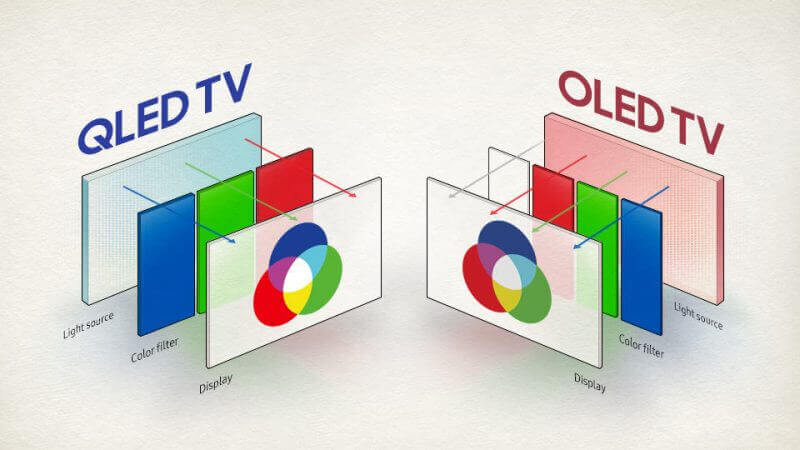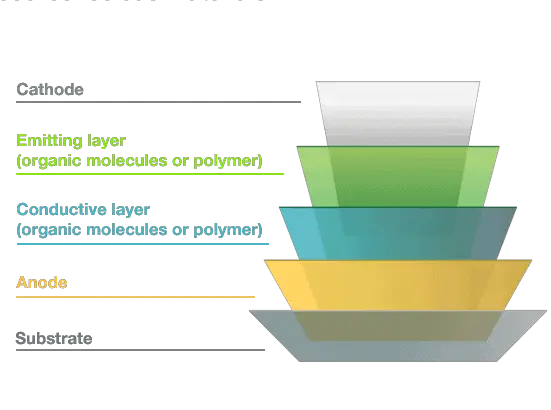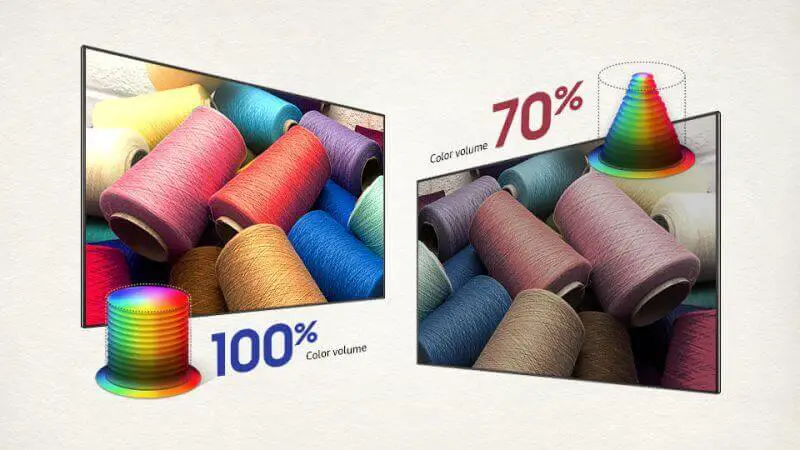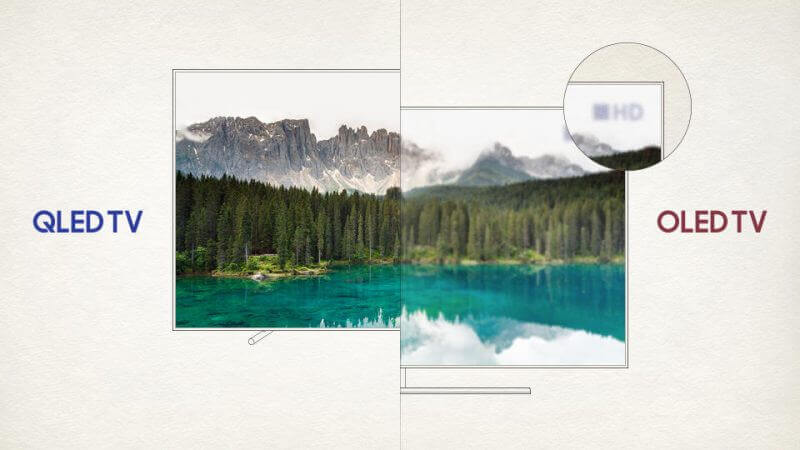Advancements in TV technologies are growing day by day. Ultra HD, 4k, and 8k TVs are becoming popular, HDR is readily available, and streaming nowadays is like shooting fish in a barrel with these TV technologies.
However, at times it can be quite baffling too. If you’re in the market, you have likely heard about the battle between two premium TV technologies, i.e., OLED VS QLED.
So, what is the specialty that has made them a subject of great discussion in the market?

In this article, we will talk about the key parameters of both TV technologies if you are in a dilemma about which one is better with regard to OLED Vs. QLED TV? All concerns regarding that will vanish after reading this article.
What Is OLED?
OLED stands for the Organic Light Emitting Diode and is often familiar as the flagship of the LG brand.
OLEDs are just a new version of LED TVs with an organic component built into them. However, a slight difference is that their displays are wildly different from LED TVs.

It uses different panels to generate and illuminate the picture on the screen. OLEDs themselves produce each pixel in a panel.
Hence, it determines the color, and that causes it to produce light. Generally, displays on OLED TVs are similar to those on now-defunct plasma TVs.
They are capable of generating a picture without an external source of illumination.
The contrast is good. Ensures deep blacks and realistic colors. OLED TVs generally do not need backlights.
They are thinner in shape, and the bezels are narrower compared to QLED TVs or other TV technologies. And that can be treated as a great difference between OLED and QLED TVs.

OLED TVs are king in TV technologies as their black levels are superb. However, it has slight issues in terms of brightness.
Compared to other TVs like QLED or LED and HDR, it doesn’t achieve the apex of brightness level. But don’t worry about the image quality. You can view it from different angles and with better picture quality.
What Is QLED?
When it comes to TV technologies, you can’t ignore QLED TVs from them. They are generally considered middle-ground TVs between LED and OLED TVs.
You know, OLED comes up with an organic Light-emitting diode technology, whereas the quantum-dot filter technology is used in QLED TVs.
This is a common difference you can see between these two premium TV technologies.

A quantum-dot filter, which has been introduced in LED, helps produce a glowing color. However, QLED TVs have a higher brightness level than LED and OLED TVs.
Though they have an optimum level of brightness quality, they are short in contrast levels and deep blacks that are superb in OLED TVs.
Samsung is the company that makes a premium series of QLED TVs. These are generally not used in smaller TVs and are available only from 43 inches, i.e., the starting point for this type of screen. OnePlus, TCL, and Vu are a few of the other manufacturers of QLED TVs in India.
OLED vs QLED

We will evaluate the comparison between the OLED and QLED based on the following parameters:
- Black Levels and Contrast
- Brightness
- Color space
- Size
- Power consumption
- Price
- Lifespan
- Eye comfort
- HDR
Black Levels and Contrast
If we talk about the black levels and contrast, OLED comes out to be in a top position, as it can get into black when it needs to.
OLED can switch off individual pixels as and when required. So a perfect black color can be achieved. However, QLED still depends on backlighting. So Black becomes somewhat greyish.
Brightness
When it comes to brightness, QLED wins the user’s heart with its extraordinary brightness.
Unlike LEDs, they use separate backlights, and that makes their brightness incredibly white. On the other hand, OLED TVs are not capable of producing the same amount of light.
Color space
According to Samsung, QLED TVs ensure high accuracy in terms of colors and offer excellent color brightness and color volume.
Samsung also claims that their QLED TVs can produce 100% sRGB, whereas OLED TVs can only go up to 70% sRGB.
But we can’t deny the fact that OLED also delivers superb colors in everyday viewing situations.

HDR
No doubt, if you are looking for a TV with HDR ( High Dynamic Range), a QLED TV is the best. The brightness can go all the way up to 2000 Nits.
This is what a human eye can withstand. Even the color accuracy and contrast are a bit high in QLED with HDR.

In contrast, OLED gives you an optimum level of brightness with perfect color accuracy and detail. So it’s again a consumer call about which one is preferable for them.
Size
Looking at the sizes of TVs, it is seen that OLED screens are limited to a max of 55 inches, whereas the QLED TVs are less expensive, and generally produce screens of various sizes. Their starting screen size is from 43 inches and goes up to 85 inches and even beyond.
Viewing Angle
If you are watching on a QLED screen, the best viewing angle for you is dead center. And, as you move side to side and up to down, color brightness and contrast gradually diminish.
On the other hand, on OLED screens, you are free to view even at drastic angles. The maximum angles range up to 84 degrees.
So, if you plan to see a movie with friends or family, OLED is the best TV option for you.
Power consumption
QLED panels generally do need a super-bright backlight. You know that backlights consume a great amount of heat, and to produce heat, we need more power.
So QLED consumes more power. Hence, we can say that OLED is good in terms of energy efficiency.
One more thing that aids in low power consumption in OLED TVs is the way OLED TV pixels work. OLED TV pixels can turn themselves off individually whenever it is required.
So even if your TV is turned ON, there might be many pixels that are switched off. This way, OLED saves more power
Price
Pricing is a real concern for people. And, if we talk about the cost of both OLED and QLED, both cost like a bomb.
Lifespan
Lifespan depends on certain factors, such as whether it has a source of backlighting or not. So, if we take this aspect into account, we can say that QLED has a high life, as it has a backlight source.
On the other hand, OLED depends on individual pixels. So even if there are some dead pixels, the TV will still work for you.

Eye comfort
It has been observed that OLED offers greater eye comfort than any other TV technology. The reason is that it produces less blue light compared to other TV technologies.
And we know that blue light is harmful to human eyes. So, in the OLED vs. QLED eye comfort race, OLED has the edge.
Conclusion: QLED Vs OLED
In a nutshell, we can say that it depends on your choice whether you choose an OLED TV or a QLED TV. If you prefer to have a TV with a great display, color, and image screen, OLED is the best for you.
However, if you are looking for a TV with fewer burn risks and a good display size, go for a QLED TV.
FAQ | OLED Vs QLED
Is QLED better than OLED
It all depends on your requirements whether QLED is better than OLED or not.
If you want bright and colorful pictures, then QLED may be a good choice.
However, if your requirement is good detailing and low power consumption, the OLED makes more sense.